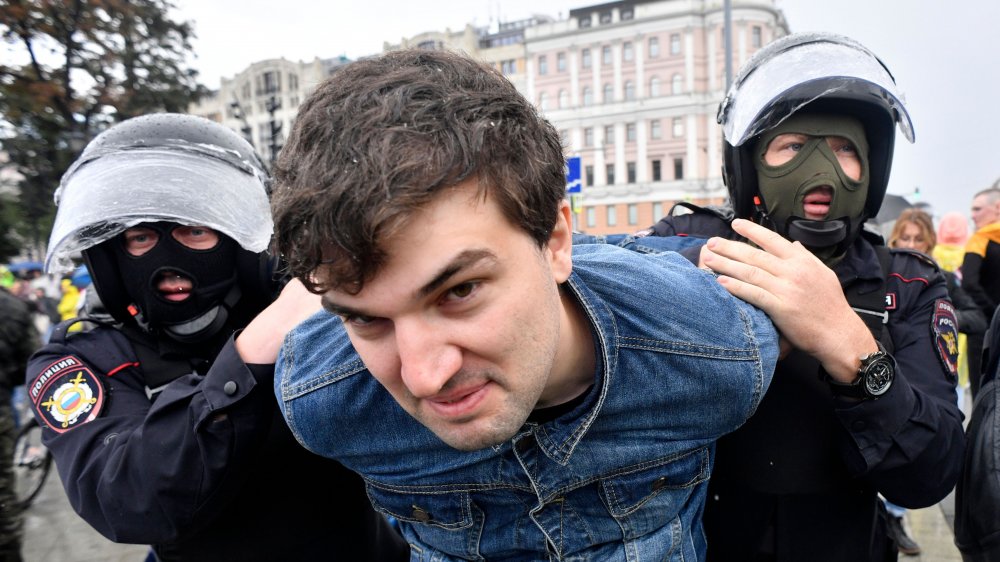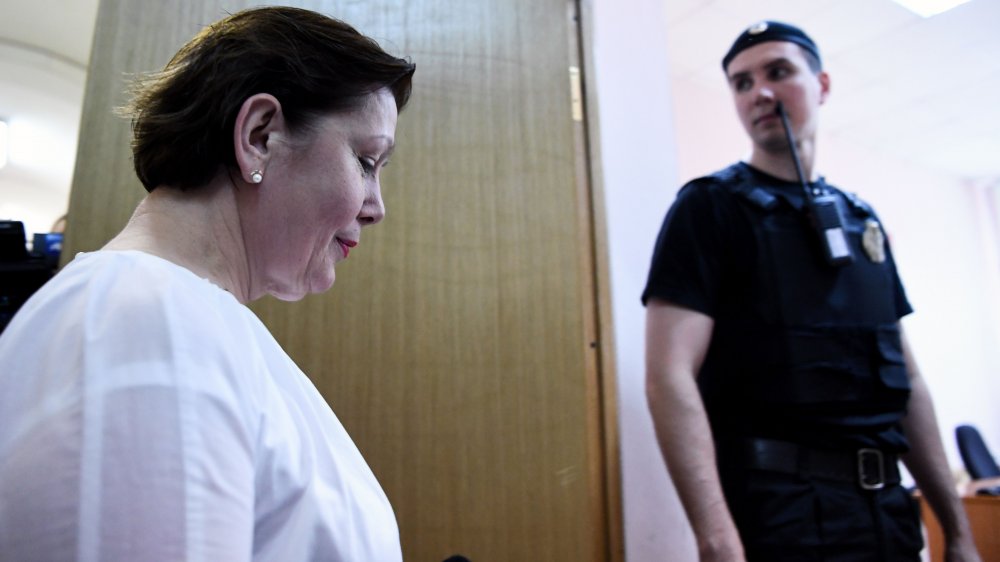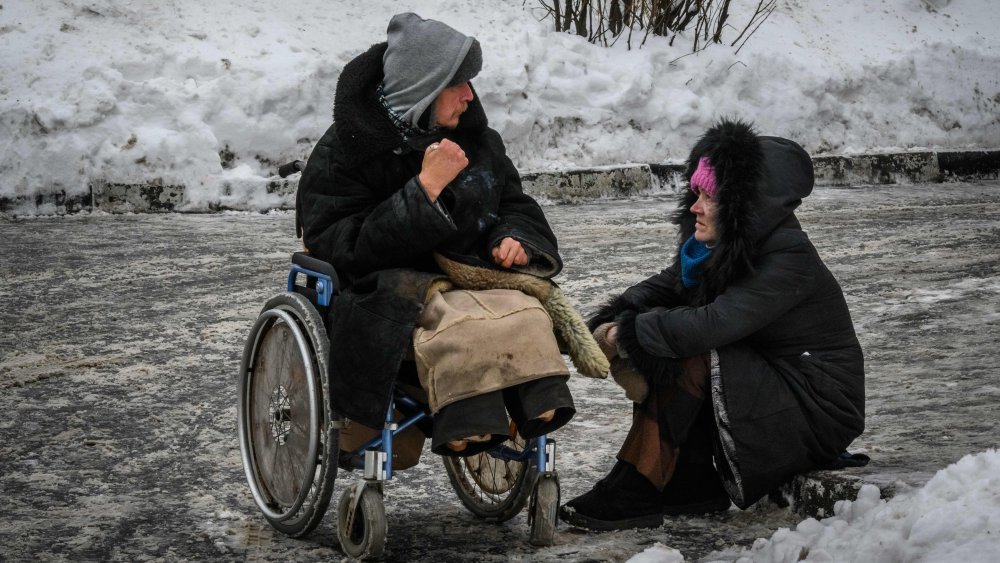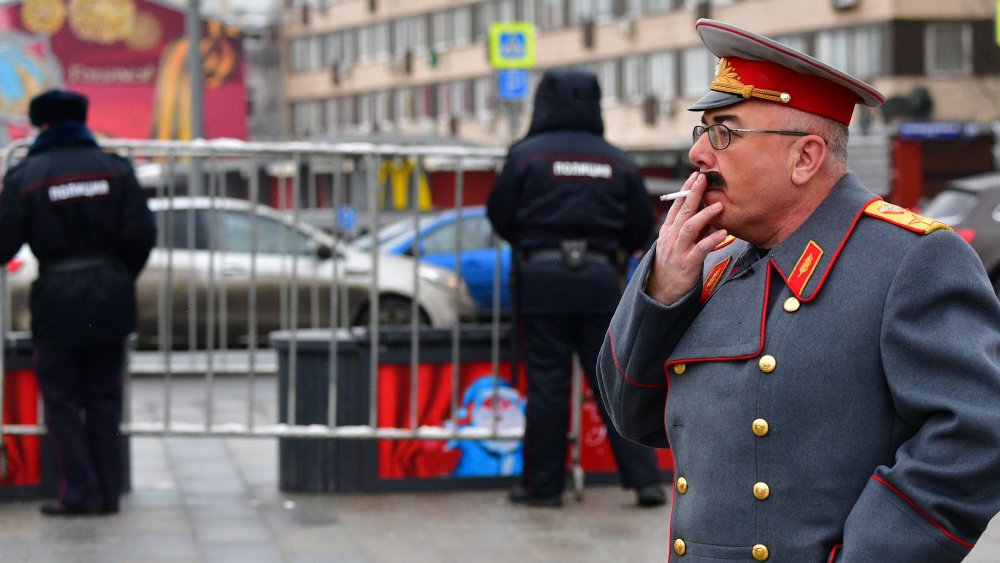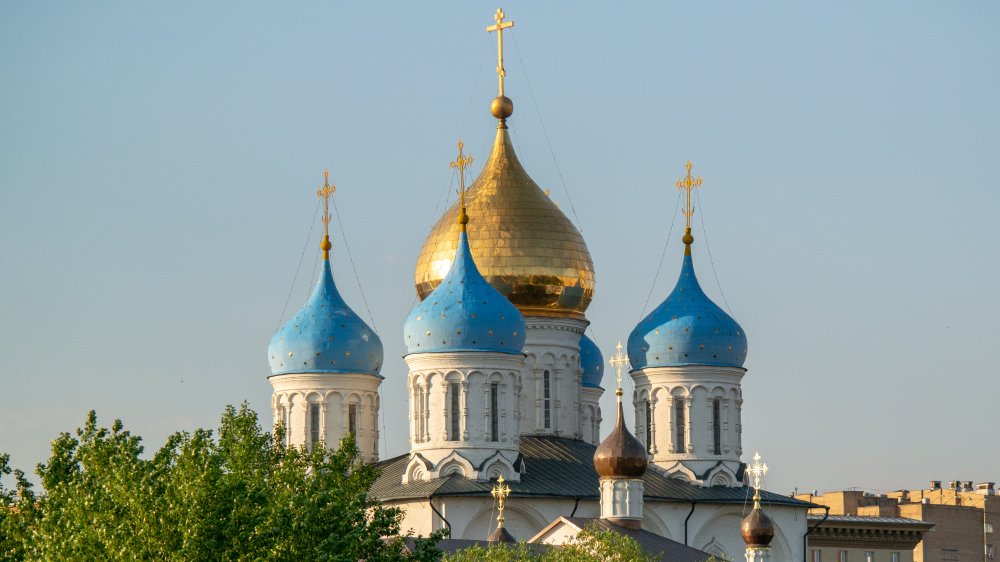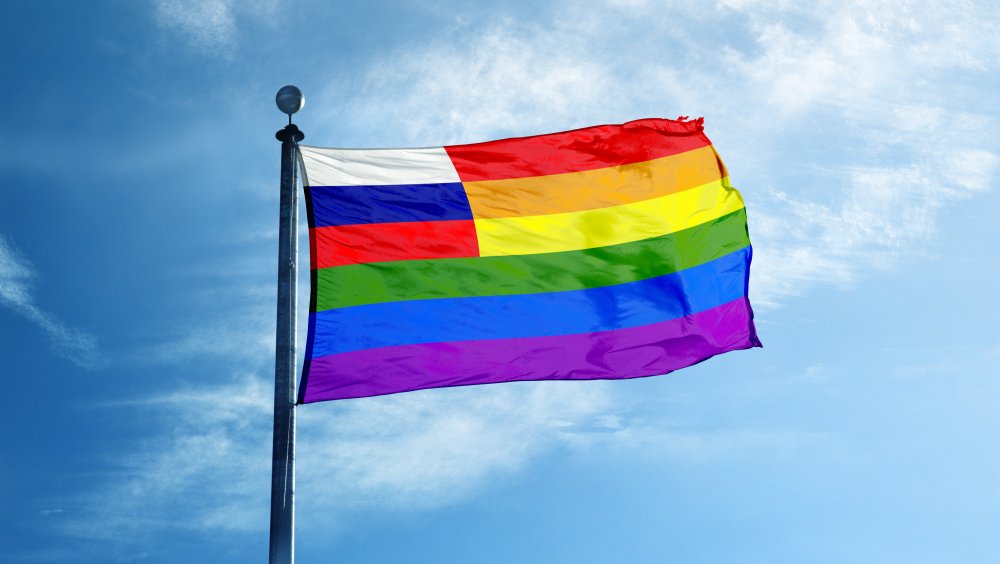Strict Rules All Russian Citizens Have To Follow
Russia is a land of contradictions — its massive geography and tremendous cultural heritage are often trumped by small-minded political power games and the use of violence to get one's way. By and large, its citizens are as wonderful as anywhere else in the world, while the head honcho is deeply disconnected from the millions of lives his decisions influence — concerned more with putting on ridiculous, misleading airs in an attempt to control his own image and popularity than with effecting lasting change for the people. In America, we have a serial Tweeter ready to fire off a scathing CAPS-locked tirade at a second's notice. Russia, on the other hand, has a power-crazed ex-KGB agent who flies a motorized hang glider with cranes in an attempt to seem cool.
But one area where everyone can agree Russia really has it worse is its ridiculous set of rules. There, people are struggling to make it in a world where everything from their memes to their underwear are liable to land them in the slammer. Obviously, what sort of skivvies you wear is no business of any governing body, but overseas, it's just another set of strict rules that all Russian citizens have to follow if they want to keep their pants out of prison.
Never disrespect the Russian government online
Anyone who's ever seen Goodfellas knows the importance of showing respect to the top dogs. Flippant remarks or even a twitch in the corner of your lip when the leader gets to "pootin'" and your life may be forfeit. Similarly, Russia's government has been noted for its uncanny ability to make dissenters "shut up" or "disappear" with very mafia-like tactics of intimidation and violence. The Guardian even goes so far as calling the country a "Gangster's paradise." That may sound Coolio if you think you're tough, but for the average citizen, it has some pretty uncool consequences. According to CNN, early 2019 saw Russian parliament rush through strict internet regulations allowing fines and even jail time for those who dare "disrespect the government online."
That's right, people found guilty of "indecent" posts demonstrating "disrespect for society, the state, (and) state symbols of the Russian Federation," (or Putin) could face "up to 15 days in administrative detention." Reuters reported that within two weeks, the bill was signed into law by Putin, who managed to double the proposed limit to how much someone could be fined for saying "Putin sucks" on Facebook — up to $6,100.
The Guardian noted that even some who usually support the Kremlin disagreed with the move, like Sergei Ivanov, an MP with the LDPR party, who said: "If we stop calling a fool a fool, he won't stop being a fool." Good one Sergei. And goodbye.
Be a good librarian or Russia will throw the book at you
When you think of people that incite hatred among the masses, chances are the first ones that come to mind are librarians — those vicious bookmongers. At least, that's what Russia's Meshchansky District Court thought of Natalya Sharina, former director of Moscow's Ukrainian Literature Library. Per RadioFreeEurope, Sharina was charged with "inciting hatred" due to certain books found in the library that were banned as "extremist." Specifically, works by Ukrainian ultranationalist Dmytro Korchynskiy caught the ire of the Russian government, which has been at odds with Ukraine after its annex of Crimea.
The hate crime charge and subsequent four year suspended sentence was widely condemned, with Amnesty International denouncing the ruling as one that displayed "utter contempt for the rule of law." According to RadioFreeEurope, "The respected Russian human rights group Memorial considered her a political prisoner" during her pretrial house arrest, and courts dismissed key evidence in favor of Sharina, including the multiple testimonies of books being planted by police.
The case is yet another example of how Putin and his empire unfairly makes examples of hapless Russian citizens.
The arts are a 'fine' route to poverty in Russia
The only thing that's worse than living in a world reminiscent of George Orwell's 1984 is a world reminiscent of Bowling for Soup's cringe-tastic anthem, 1985. But many in Russia would be happy to hear the power-pop-punk group's aural assault rather than have their right to artistic expression limited.
Since 2014, Russia has made it illegal to swear in "films, television broadcasts, theatres and the media," according to the BBC. Breaking the rules will result in fines up to $1,400 for organizations and up to $70 for individuals, while repeat offenders with pottymouths can tally up bigger fines, leaving their piggy banks in the toilet. Books containing swear words will have to have a warning on the cover, and even more Orwellian is its policy on figuring out whether or not a word is bad. "Where disputes arise," says the BBC, "a panel of experts will decide exactly what counts as a swear word."
The reasoning is rather dense, with the official explanation stating the law "bans the use of obscene language when ensuring the rights of Russian citizens to the use of the state language, and protecting and developing language culture," according to CNN.
Smoking can land your butt in Russian prison
In some ways, the right to smoke is like a lesser version of the right to bear arms — you should have the freedom to do so as long as you don't hurt others, and you're well aware of the potential risks involved.
Surprisingly, on paper at least, Russia isn't too hot on smoking. Tobacco Control Laws states that there is a "comprehensive ban on smoking in indoor workplaces... public places, and public transport." There's just one exception — long distance passenger ships. If you're on the Titanic, you might as well live a little, right?
Just like America, the smoking age is 18, and warnings are required on the labels. All this might seem pretty normal, but Russian law also dictates that you can't smoke "in the vicinity" of many public places, according to Culture Trip, which means you've got to take a small hike to light up. Considering how cold it gets, there are times when you might be risking your life to enjoy a drag. While this law is impossible to regularly enforce, if you're caught breaking it, police will immediately butt-in to your smoking experience and ask you to put the butt out. Defy them, and you could be looking at anything from a fine to 15 days in jail, where it may actually be easier to acquire and smoke cigarettes. So, look twice — you could save a light.
No ID in Russia? Don't risk it
In America, if you leave home without ID, the worst that usually happens is having to get a friend to order your drink, or getting a ticket from a cop if you're driving like Dale Earnhardt Jr. In Russia? You're safer forgetting your long johns in Siberia. Russia Beyond says Russian police are allowed to stop "anyone and everyone to check their documents to see if everything is in order." And if you don't look Slavic, your odds are higher, because they assume your visa might not be valid.
Forget your ID on the way to goulash store or just "look funny," and a Russian policeman can detain you for up to three hours if you don't show them ID — time they'll use to establish your identity and/or make you soil your trousers. If those documents look fake, you might earn a trip to the police station for a deeper dive on your internet search history. If this happens to you, the most important thing is to stay calm. Freak out and you could be looking at 15 days for resisting arrest.
But don't get the wrong idea — this is typically a scenario where the police are just doing their job. According to Culture Trip, they're mostly looking for migrant workers, and usually check IDs in public places like subways and public squares. Keep your passport on you, stay cool, and you're golden.
Don't you dare wear lacy underwear in Russia
Often in the Western world, some people feel a little scandalous stepping foot in a Victoria's Secret. In Russia, Victoria would have to keep things extra secret, because peddling lacy underwear is a violation of the law. Apparently, Russia takes their "no frills" attitude extremely seriously.
According to PRI, the Russian government determined that synthetic fabric is bad for its citizens' health, proclaiming that "underwear made from synthetic lace can no longer be imported into, manufactured by, or sold within the Russian-dominated Eurasian Customs Union," which includes Russia, Belarus and Kazakhstan.
Specifically, they took issue with synthetic underwear's "low hygroscopicity," which is a super frilly and fancy way of saying it's not very breathable. However, poor lacy underwear became the center of the controversy, and according to CNN, "most luxury lingerie is made of materials with less than 4 percent cotton." Frankly, that just won't fly.
You can blog, but can't hide
Imagine a scenario where you really love frogs. You live in Russia, and enjoy studying its native amphibious critters such as the Siberian wood frog. You want to share your passion with other frog lovers, so you start blogging about the Siberian wood frog, and extrapolating about how better to maximize its five to 11-year lifespan, per World Atlas. Your passionate prose on Siberian wood frog diet supplementation gets you 3,001 followers, but you're also embarrassed, because you live in a town that hates Siberian wood frogs, and will persecute anyone who associates with them — so you stay anonymous.
Unfortunately for you and your frog blog, you've just broken the law, because in Russia, you're not allowed to run an anonymous blog with more than 3,000 followers or daily readers. The Independent reports that plus-3,000 reader blog owners must register their name and personal information, making them a "media outlet." In a world that hates frogs, that's dangerous business, which could lead to oppression and violence. Now imagine that instead of a frog blog, you run a political blog that voices opinions which chafe Putin's underoos, and it's easy to see how dangerous this law is.
The BBC noted that the same law requires social media accounts store six months of data on users in servers on Russian soil, which sounds pretty Big Brother-ish.
Never twerk on sacred Russian ground
Russia takes its war memorials seriously, and to be fair, they have good reason to — in World War II alone, the Soviet Union suffered almost 17 million casualties, more than 15 percent of its population at the time, according to Business Insider. That stings. But apparently, nothing is a more potent reminder of the horrors of war than making one's butt apparent by twerking in proximity to a war monument.
Case in point — a pretty tame 2015 video posted by six girls from a dance school in the town of Novorossiysk. The video was an advertisement for the school, and simply used the monument as a backdrop. In fact, there's not much within the dance that could be classified as twerking at all. Nevertheless, Newsweek reports that a scandal and investigation immediately ensued. RT says the "outraged" mayor charged officials with finding the names of the dancers, and the city's education department press secretary Viktoriya Dikaya stated: "We condemn these women. Every inch of this land is covered in blood. It is inappropriate."
When the dust settled, two girls were fined while a mother of another girl, who was underage, was also fined for recklessness "in regard to her child's intellectual and spiritual development." But they got off easy compared to the other three, who got jail time. Two of those dancers did 10 days in jail, while one did 15. The question is — did they dance too well, or not well enough?
An eye for an insult
It's not nice or productive to insult other people's religious beliefs ... even if they happen to be related to Scientology and Lord Xenu's magic mystery explosion in the sky. However, it's one of those sticky parts of free speech — even though you shouldn't do it, you should be allowed to do it. It's the principle of the matter. Unfortunately, Russia does not share this belief.
According to Politico, since 2013, it violates Russian law to "insult the feelings of religious believers." Those who protested the building of a Russian Orthodox Church because it would have replaced a beloved park had their homes raided in an operation involving over 150 police officers. Such was the case with Yevgeny Lebedev, at home with his wife and children when the armored officers stormed his house before dawn. "They forced me to lie on the floor with my face down," Lebedev recalled of the raid. "They wouldn't let me look up while they searched the apartment. My children were terrified. It took my 5-year-old daughter a long time to get over it."
Protesting, which apparently falls under the "insulting acts" category, can land offenders in prison for up to a year. So too, can posting "God doesn't exist" on a satirical website, as was the case with Viktor Krasnov, who went to trial only after being hospitalized and tested for insanity, according to Euronews. Regardless of what you believe, that sort of oppression is not cool, man!
Wear a bulletproof vest when you peacefully protest in Russia
Using force to quell the masses is never ideal, but if things get really crazy, sometimes drunken rioters need a little help sobering up. However, it doesn't take a flaming cop car to bring out the batons and beatings in Russia. In fact, all it takes is a peaceful protest.
"By the weekend, downtown Moscow is a warzone," says The Guardian in an article detailing "unprecedented repression" of protesters throughout 2019 in Moscow and other parts of Russia. With a less colorful but equally damning report, Human Rights Watch described events at a September 9, 2018 protest over government plans to raise the pension age: "Police arbitrarily detained hundreds of peaceful protesters, including older people and children... In many cities, the police kicked peaceful protesters and beat them with truncheons." All told, on that day alone, "at least 1,195 people, including at least 60 children, across 39 cities," were taken into custody. Better yet for democracy, police detained "at least 14 journalists who were covering the protests and beat at least three of them." If you're a journalist, you've got to like those odds, but if you're a citizen who values a free and open country, you might be less thrilled.
Jokes aside, this represents the disparity between the average citizen and the government in Russia, and serves as a reminder that the bad press we so often hear is usually the result of a small margin who make decisions that affect everyone.
You're gay in Russia? You don't say!
Bad news for bears or anyone else who happens to fall under the LGBT banner — Russia is incredibly intolerant when it comes to sexuality. Per Human Rights Watch, a 2013 "gay propaganda" law signed by Putin made it illegal to share any information regarding the LGBT community "via the press, television, radio, and the internet." That law was used as a justification to shut down websites providing "valuable information and services to teens across Russia," including support groups and mental health services.
But that's all the tip of the iceberg of what amounts to persecution of anything LGBT in Russia. NBC reported that "Sixty-three percent of Russians surveyed said they believe a secret organization is trying to 'destroy' the country's 'spiritual values' through gay propaganda." That kind of sentiment makes Alex Jones' views on the frog and water homosexuality conspiracy seem like dust in the wind.
You can imagine that if it's illegal to speak about to gayness, actually being gay can be very dangerous. And you'd be right. BBC says the law can be leveraged to heavily fine or arrest citizens, and in parts of Russian-controlled territories like Chechnya, people have been beaten, tortured and even killed for the "sin" of not being straight. If you happen to be L,G,B,T or any other letter in Russia, it is highly recommended to keep it on the down low — for your own safety.
Repost and you're toast
The Russian constitution guarantees freedom of speech and press, but it seems the constitution is in dire need of some Imodium, because those terms seem very loose and runny. One false move and you're confined to a fate far worse than a 12-hour toilet day. In Russia, simply reposting the wrong thing on social media can land you in hot, mucky water. Take for example, the case of Dmitry Semyonov, who dared to repost not once, but twice. Shudders.
The conniving 27-year-old prankster was convicted of reposting "extremist" content, according to RadioFreeEurope, a site created to track human rights abuses. The offending repost was a photo of a conservative lawmaker wearing a shirt which read "Orthodoxy or Death," a phrase "included in the Justice Ministry's official list of banned extremist materials because it was deemed to stoke religious hatred." As horrifying as this offense was, Semyonov then had the audacity to repost a news article about his own conviction, resulting in another conviction, this time for "mass distribution of extremist materials." Semyonov, who had plans to run as a liberal candidate in his city government, felt the convictions were designed to scuttle his chances of holding office.
This is nothing new in Russia. Take the case of Yevgenia Chudnovets, a well-meaning kindergarten teacher who reposted a video of a child being abused at summer camp. Despite helping lead to the abusers' capture, she was sentenced to five months in jail, before eventually being released.
